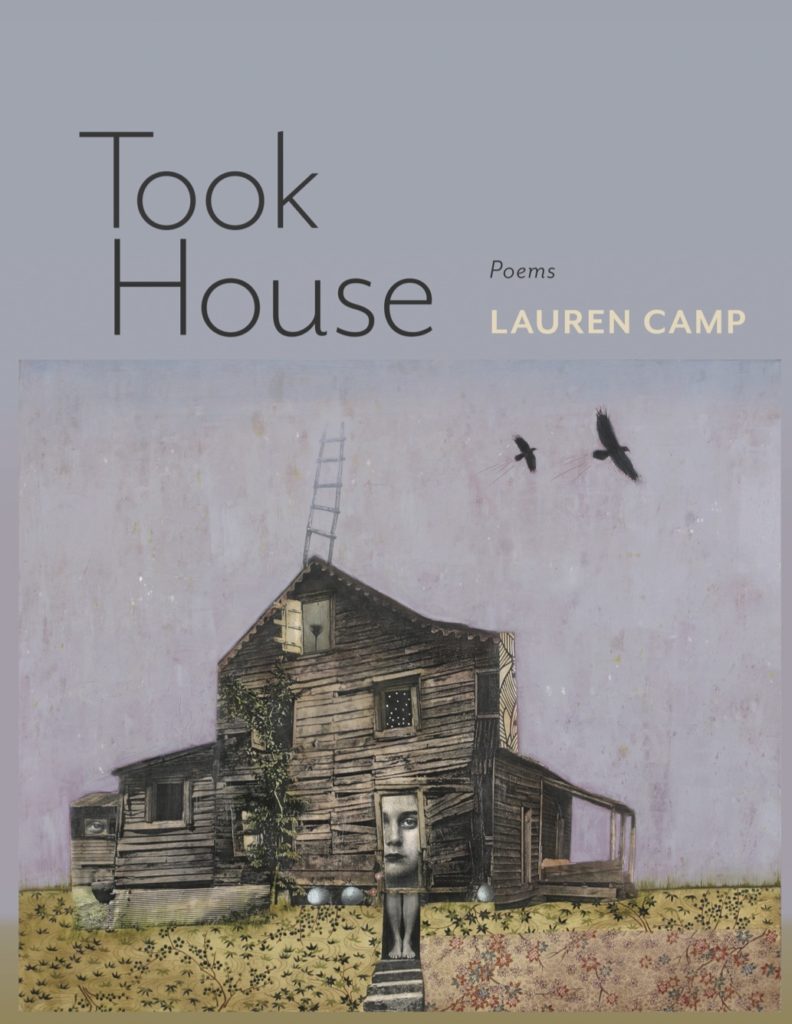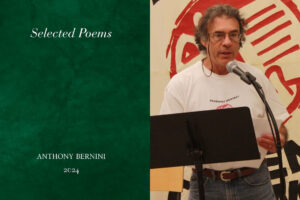Took House
by Lauren Camp
Tupelo Press, 2020
Like the artwork explored in the poem “The Bed on the Wall,” inspired by Robert Rauschenberg’s “Bed,” Lauren Camp’s collection Took House seems to be a combination of what we share and what we keep hidden. “Bed” is not sculpture and not painting, the piece is somewhere in between art and real life much like each poem in Camp’s new collection. In the poems, Camp questions what is behind what we see which is like when looking at “Bed:”
with the overlapping tongue
of his brushes, with pattern interruption, the departure
from edges. Let’s say he is within
his composition. Inside
his story. As he tips
the paint, the objective can be taken
altogether away until he detects
only desire: a rough strike
of purple
censured from exuberance. The room remains
 Where Camp suggests that behind the image created is a solar system of emotions. In Rauschenberg’s piece the bed is a metaphor just like the recurring motif of the table in Camp’s Took Home. A table like a bed like a canvas is a place of intimacy, a place where we indulge, where we come together to share an experience with others. The first poem in Camp’s collection “Appetite,” seems to feed into that metaphor:
Where Camp suggests that behind the image created is a solar system of emotions. In Rauschenberg’s piece the bed is a metaphor just like the recurring motif of the table in Camp’s Took Home. A table like a bed like a canvas is a place of intimacy, a place where we indulge, where we come together to share an experience with others. The first poem in Camp’s collection “Appetite,” seems to feed into that metaphor:
And now in the useless unceasing, there is a heart
in one part of town, where there is a table
that is most like a cliff, a place to render
fewer potentials. There is a glass
near a bottle that will offer what she asks.
In that room, or the next, is an intimate slowing
So often, we hear the saying, “We eat with our eyes,” and I feel like Camp is reminding us of this by creating lines that are visually stimulating, that bring us into the poem and to the table where Camp then shares spoonfuls of intimacy. She confesses, “She put it on the table/ and looked at the table under the eye/ of everything that could go wrong,/ everything that did,” which allows the reader into what is going on behind that moment, in one of the minds that is seated at the table. Camp’s ability to juxtapose images with underlying thoughts allows the reader to interpret the poem in a myriad of ways. It’s impossible not to appreciate how she never forces the reader into a response and that is what I admire most in these pieces.
Throughout the collection, the returning images of the table make you consider the collection as a whole while simultaneously Camp has a way of redirecting your thoughts. In “Equivalent;”
Tomorrow I’ll have something in common
with those who once lived here:
the warm sounds of old wounds.
The knife upside-down in the kitchen, the jawbone
on a fence on the hillside, and the man
with a shaker of salt. It will all stay the same.
Camp reminds us that we have the opportunity of a shared experience if we take the time to connect with one another. The shaker of salt is an image that reminds us of just how common our lives are. Camp’s table is your table and the house built around that table can take us to places that we never imagined if we take the time to contemplate what is hidden behind what we are looking at.
The last piece in the collection, “Homeostasis: Autumn,” reminds us that a desk is a table too, one where writers share in a different way, but in a way that is just as intimate. The narrator paints a picture with words:
A squash we didn’t plant has come in gold across the aspen roots.
Two hawks burst over, claiming a rotating sky.
The desert, normally dry, emits a faint scent, the damp wisp of cedar.
Water has gathered in holes we dug.
This is why the pangs of time are necessary.
Here, Camp brings us outside of our houses into a yard of emotions where we can see how we are not only connected with one another but also with the natural world. She says, “Enough time to rest and plunge back across the pebbles/to my pens and desk,” and that is where she creates artwork that transcends the desk, the table, the bed, the canvas and pours out of her house and into ours.
Camp’s collection is a walk through a gallery and I appreciate the experience especially right now. I appreciate the invitation to gaze upon the images she creates and interpret each piece in a different way. In certain lights, from different angles, these pieces all have legions of ideas that allow the reader to connect in an intimate manner.
Lauren Camp is the author of five volumes of poetry, most recently Took House (Tupelo Press, 2020). Winner of the Dorset Prize, Lauren has also received fellowships from The Black Earth Institute and The Taft-Nicholson Center, and finalist citations for the Arab American Book Award, the Housatonic Book Award, and the New Mexico-Arizona Book Award. Her work has been translated into Mandarin, Turkish, Spanish, and Arabic.
She lives in New Mexico, where she teaches creative writing to people of all ages.





